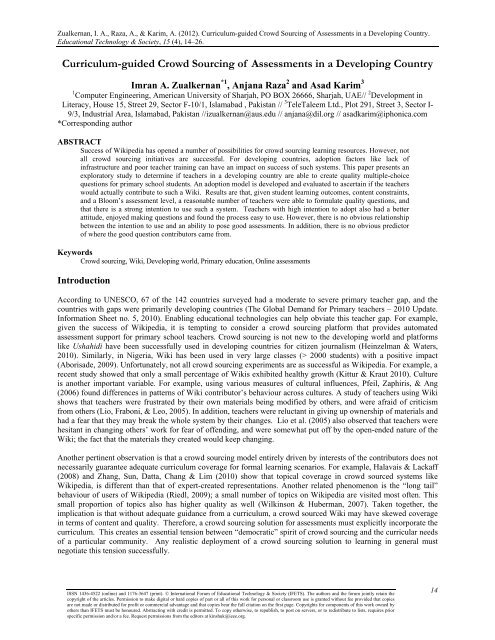October 2012 Volume 15 Number 4 - Educational Technology ...
October 2012 Volume 15 Number 4 - Educational Technology ...
October 2012 Volume 15 Number 4 - Educational Technology ...
You also want an ePaper? Increase the reach of your titles
YUMPU automatically turns print PDFs into web optimized ePapers that Google loves.
Zualkernan, I. A., Raza, A., & Karim, A. (<strong>2012</strong>). Curriculum-guided Crowd Sourcing of Assessments in a Developing Country.<br />
<strong>Educational</strong> <strong>Technology</strong> & Society, <strong>15</strong> (4), 14–26.<br />
Curriculum-guided Crowd Sourcing of Assessments in a Developing Country<br />
Imran A. Zualkernan *1 , Anjana Raza 2 and Asad Karim 3<br />
1 Computer Engineering, American University of Sharjah, PO BOX 26666, Sharjah, UAE// 2 Development in<br />
Literacy, House <strong>15</strong>, Street 29, Sector F-10/1, Islamabad , Pakistan // 3 TeleTaleem Ltd., Plot 291, Street 3, Sector I-<br />
9/3, Industrial Area, Islamabad, Pakistan //izualkernan@aus.edu // anjana@dil.org // asadkarim@iphonica.com<br />
*Corresponding author<br />
ABSTRACT<br />
Success of Wikipedia has opened a number of possibilities for crowd sourcing learning resources. However, not<br />
all crowd sourcing initiatives are successful. For developing countries, adoption factors like lack of<br />
infrastructure and poor teacher training can have an impact on success of such systems. This paper presents an<br />
exploratory study to determine if teachers in a developing country are able to create quality multiple-choice<br />
questions for primary school students. An adoption model is developed and evaluated to ascertain if the teachers<br />
would actually contribute to such a Wiki. Results are that, given student learning outcomes, content constraints,<br />
and a Bloom’s assessment level, a reasonable number of teachers were able to formulate quality questions, and<br />
that there is a strong intention to use such a system. Teachers with high intention to adopt also had a better<br />
attitude, enjoyed making questions and found the process easy to use. However, there is no obvious relationship<br />
between the intention to use and an ability to pose good assessments. In addition, there is no obvious predictor<br />
of where the good question contributors came from.<br />
Keywords<br />
Crowd sourcing, Wiki, Developing world, Primary education, Online assessments<br />
Introduction<br />
According to UNESCO, 67 of the 142 countries surveyed had a moderate to severe primary teacher gap, and the<br />
countries with gaps were primarily developing countries (The Global Demand for Primary teachers – 2010 Update.<br />
Information Sheet no. 5, 2010). Enabling educational technologies can help obviate this teacher gap. For example,<br />
given the success of Wikipedia, it is tempting to consider a crowd sourcing platform that provides automated<br />
assessment support for primary school teachers. Crowd sourcing is not new to the developing world and platforms<br />
like Ushahidi have been successfully used in developing countries for citizen journalism (Heinzelman & Waters,<br />
2010). Similarly, in Nigeria, Wiki has been used in very large classes (> 2000 students) with a positive impact<br />
(Aborisade, 2009). Unfortunately, not all crowd sourcing experiments are as successful as Wikipedia. For example, a<br />
recent study showed that only a small percentage of Wikis exhibited healthy growth (Kittur & Kraut 2010). Culture<br />
is another important variable. For example, using various measures of cultural influences, Pfeil, Zaphiris, & Ang<br />
(2006) found differences in patterns of Wiki contributor’s behaviour across cultures. A study of teachers using Wiki<br />
shows that teachers were frustrated by their own materials being modified by others, and were afraid of criticism<br />
from others (Lio, Fraboni, & Leo, 2005). In addition, teachers were reluctant in giving up ownership of materials and<br />
had a fear that they may break the whole system by their changes. Lio et al. (2005) also observed that teachers were<br />
hesitant in changing others’ work for fear of offending, and were somewhat put off by the open-ended nature of the<br />
Wiki; the fact that the materials they created would keep changing.<br />
Another pertinent observation is that a crowd sourcing model entirely driven by interests of the contributors does not<br />
necessarily guarantee adequate curriculum coverage for formal learning scenarios. For example, Halavais & Lackaff<br />
(2008) and Zhang, Sun, Datta, Chang & Lim (2010) show that topical coverage in crowd sourced systems like<br />
Wikipedia, is different than that of expert-created representations. Another related phenomenon is the “long tail”<br />
behaviour of users of Wikipedia (Riedl, 2009); a small number of topics on Wikipedia are visited most often. This<br />
small proportion of topics also has higher quality as well (Wilkinson & Huberman, 2007). Taken together, the<br />
implication is that without adequate guidance from a curriculum, a crowd sourced Wiki may have skewed coverage<br />
in terms of content and quality. Therefore, a crowd sourcing solution for assessments must explicitly incorporate the<br />
curriculum. This creates an essential tension between “democratic” spirit of crowd sourcing and the curricular needs<br />
of a particular community. Any realistic deployment of a crowd sourcing solution to learning in general must<br />
negotiate this tension successfully.<br />
ISSN 1436-4522 (online) and 1176-3647 (print). © International Forum of <strong>Educational</strong> <strong>Technology</strong> & Society (IFETS). The authors and the forum jointly retain the<br />
copyright of the articles. Permission to make digital or hard copies of part or all of this work for personal or classroom use is granted without fee provided that copies<br />
are not made or distributed for profit or commercial advantage and that copies bear the full citation on the first page. Copyrights for components of this work owned by<br />
others than IFETS must be honoured. Abstracting with credit is permitted. To copy otherwise, to republish, to post on servers, or to redistribute to lists, requires prior<br />
specific permission and/or a fee. Request permissions from the editors at kinshuk@ieee.org.<br />
14

















